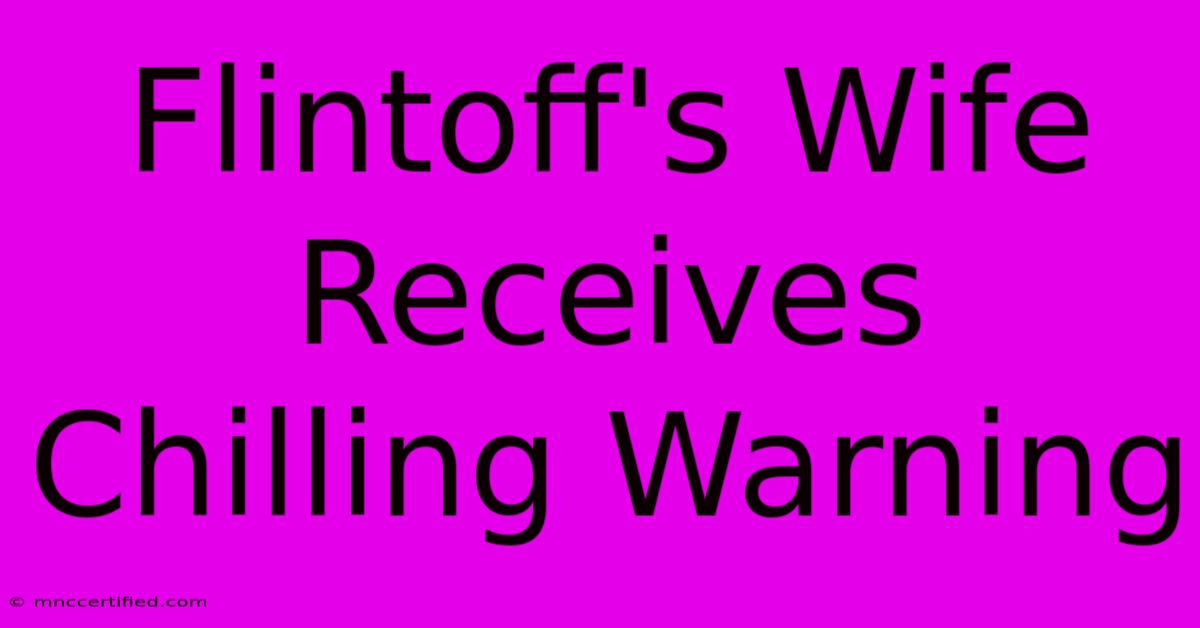Flintoff's Wife Receives Chilling Warning

Table of Contents
Flintoff's Wife Receives Chilling Warning: A Deep Dive into the Story
Andrew Flintoff, a cricketing legend, recently found himself at the center of a concerning incident when his wife, Rachael Flintoff, received a chilling warning. This event sparked widespread media attention and raised serious questions about online safety and the impact of fame on personal lives. This article will delve into the details of the incident, analyze the potential implications, and explore the broader context of online harassment and celebrity privacy.
The Chilling Warning: What Happened?
While precise details surrounding the warning remain somewhat vague to protect the family's privacy, reports indicate Rachael Flintoff received a threatening message, the content of which has not been publicly disclosed. The severity of the threat prompted a significant police response and has understandably caused considerable distress for the Flintoff family. The incident highlights the vulnerability even high-profile individuals face in the digital age, despite the protective measures they may have in place. Online safety, even for those with resources, is a critical issue that deserves attention.
The Impact of Social Media and Online Harassment
The incident involving Rachael Flintoff underscores the pervasive issue of online harassment and the chilling effect it has on individuals and families. Social media, while offering numerous benefits, also provides a platform for anonymous threats and abusive behavior. The ease with which individuals can hide behind pseudonyms and engage in harmful online activities makes it difficult to combat. This case serves as a stark reminder of the need for stronger online safety measures and robust legal frameworks to protect individuals from such threats. Celebrity privacy is often disregarded in the rush for online engagement, further compounding the problem.
The Response and its Significance
The police response to the threat received by Rachael Flintoff demonstrates the seriousness with which such incidents are treated. While specifics of the investigation remain confidential, the swift action taken suggests a commitment to ensuring the safety and well-being of the family. This response should serve as reassurance to others who experience similar threats, highlighting the importance of reporting such incidents to the appropriate authorities. Cybersecurity experts and law enforcement agencies are continually working to improve methods of tracking and prosecuting online harassers.
Looking Ahead: Protecting Individuals in the Digital Age
The Flintoff family's experience underscores the urgent need for improved online safety measures. This includes greater accountability for social media platforms in addressing online abuse, enhanced education on responsible online behavior, and stronger legal penalties for perpetrators of online harassment. Online safety tips should be widely promoted, particularly for those in the public eye. This could involve utilizing strong privacy settings, reporting abusive content immediately, and potentially employing professional security measures.
The incident also prompts a discussion about the balance between public interest and personal privacy. While celebrities often accept a degree of public scrutiny, this should never extend to threats or harassment that compromise their safety and well-being. Protecting celebrity privacy needs to be a collective effort involving media outlets, social media platforms, and the public.
Conclusion: A Call for Change
The chilling warning received by Rachael Flintoff is a wake-up call. It's a stark reminder of the dangers lurking in the digital world and the urgent need for a more robust response to online harassment. It’s crucial that we prioritize online safety and work together to create a digital environment where individuals, regardless of their public profile, can feel safe and secure. The conversation surrounding this incident should fuel a broader discussion on responsible online behavior, stronger legal frameworks, and increased accountability for those who spread hate and violence online. This isn't just about the Flintoffs; it's about protecting everyone in the digital age.

Thank you for visiting our website wich cover about Flintoff's Wife Receives Chilling Warning. We hope the information provided has been useful to you. Feel free to contact us if you have any questions or need further assistance. See you next time and dont miss to bookmark.
Featured Posts
-
Friendly Fire Us Jet Downed
Dec 23, 2024
-
Bournemouth Thrash United Full Match Report
Dec 23, 2024
-
10 Mariah Carey Holiday Hits
Dec 23, 2024
-
Belfast Airport Runway Closure Aer Lingus Impact
Dec 23, 2024
-
Froholdt And Brown Active For Cardinals Game
Dec 23, 2024